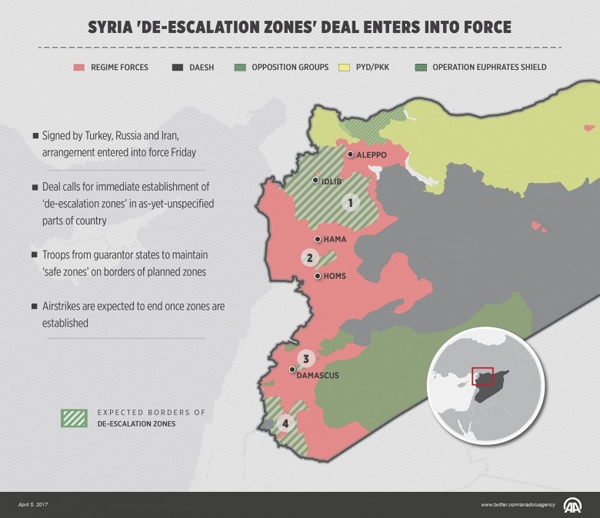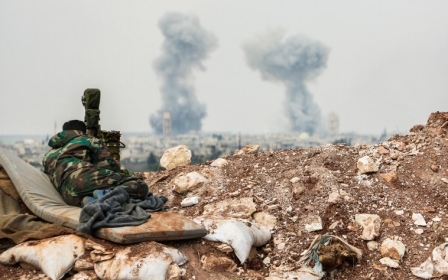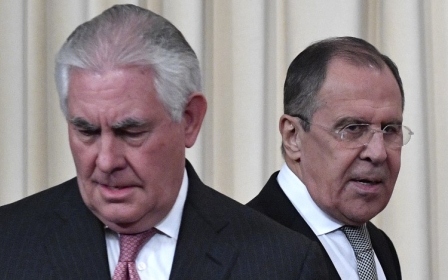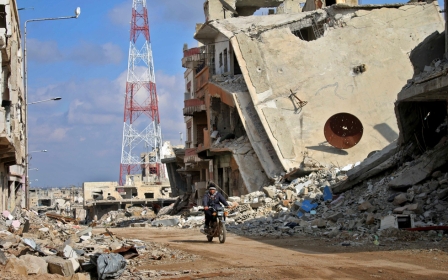Syrian fighting 'sharply reduced' as Russia pushes safe zones
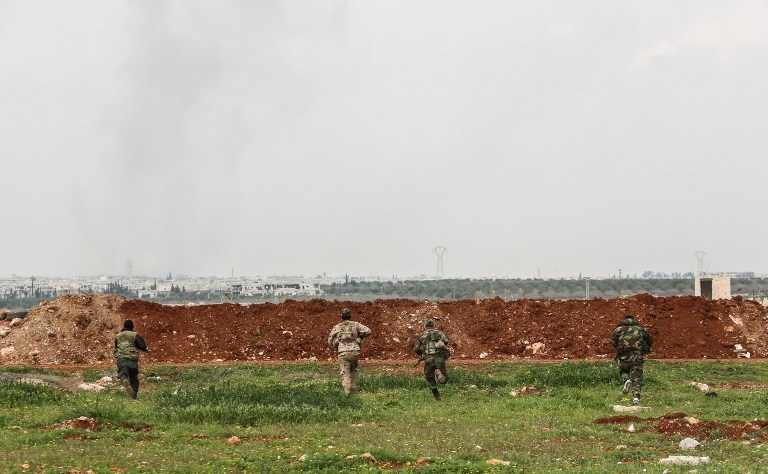
Fighting between Syrian rebel and government forces eased on Saturday as a Russian-led effort to shore up a ceasefire took effect, although battles continued on an important frontline near Hama, a rebel commander and war monitor said.
The rebel commander said the general level of violence was reduced, but added: "Regime attempts (to advance) in the Hama countryside continue."
The deal to create "de-escalation" zones in the major areas of conflict in western Syria took effect at midnight.
The initiative was proposed by Russia, President Bashar al-Assad's most powerful ally, with the support of Turkey, which backs the opposition. Iran, Assad's other major ally, also backed it.
Political and armed opposition groups have rejected the proposal, saying Russia has been unwilling or unable to get Assad and his Iranian-backed militia allies to respect past ceasefires.
The Syrian government said it backed the proposal but said it would continue to fight what it called terrorist groups across the country.
The Syrian Observatory for Human Rights said there had been a reduction in fighting across Syria since the deal came into force, but warned it was too early to say whether it would last.
In the early hours of Saturday, Syrian government jets fired at the rebel-held village of al-Zalakiyat and nearby positions in the Hama countryside, where the combatants exchanged shelling, the Syrian Observatory for Human Rights said.
The Britain-based war monitoring group said government forces shelled the nearby towns of Kafr Zita and Latamneh. There was no immediate comment from the Syrian army.
The Observatory's spokesman Rami Abdel Rahman said violence had however "sharply reduced" as Saturday progressed.
Mohammed Rasheed, a spokesman for the Jaish al-Nasr rebel group based in Hama, confirmed that fighting had broken out after midnight.
Agreement published
Meanwhile, Russian and US chiefs agreed on Saturday to fully resume co-operation on preventing mid-air incidents over Syria, Russian news agencies quoted the Russian defence ministry as saying.
Russian and US generals Valery Gerasimov and Joseph Dunford discussed in a phone call the Syria de-escalation zones and agreed to continue working on additional measures aimed to avoid clashes in Syria, the reports said.
Iran and Turkey agreed on Thursday to a Russian proposal to establish four separate de-escalation zones in Syria for at least six months, according to a text detailing the agreement published by the Russian foreign ministry on Saturday.
The largest de-escalation zone includes Idlib province and adjoining districts of Hama, Aleppo and Latakia provinces. The other three zones are in northern Homs province, the Eastern Ghouta region east of the capital Damascus and along the Jordanian border in southern Syria.
The agreement envisaged the halt of hostilities between Syrian government forces and armed opposition groups within the zones and the creation of conditions for humanitarian access, medical assistance, the return of displaced civilians to their homes and the restoration of damaged infrastructure.
The guarantors will finalise maps of the de-escalation zones by 4 June, and the agreement can be extended automatically if the three guarantor states agree.
The Russian defence ministry had said the agreement would come into force in the early hours of Friday.
With the help of Russia and Iranian-backed militias, the Syrian government has gained the military upper hand in the six-year conflict. The wide array of rebel groups include some supported by Turkey, the US and Gulf monarchies.
The main Syrian opposition body, the High Negotiations Committee, which includes political and armed groups, denounced the plan earlier as vague. The committee said the deal "was concluded without the Syrian people" and "lacks the minimum basics of legitimacy".
The deal marks the latest diplomatic effort to quell the fighting. Several truces and agreements have fallen apart during the multi-sided war, in which hundreds of thousands of people have been killed.
New MEE newsletter: Jerusalem Dispatch
Sign up to get the latest insights and analysis on Israel-Palestine, alongside Turkey Unpacked and other MEE newsletters
Middle East Eye delivers independent and unrivalled coverage and analysis of the Middle East, North Africa and beyond. To learn more about republishing this content and the associated fees, please fill out this form. More about MEE can be found here.


